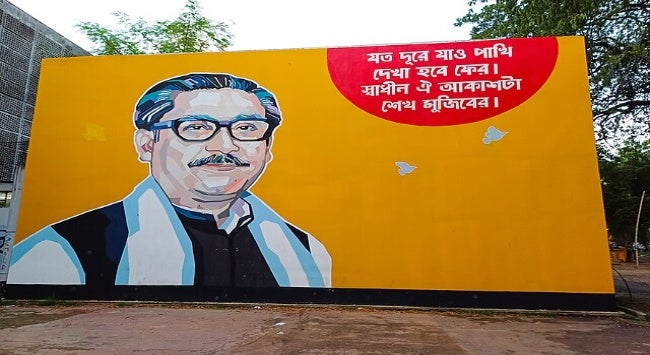Political Shifts, Historical Revisions:
Bangladesh’s Cultural and Political Realignment
Imran Ahmed
10 January 2025Summary
Recent developments in Bangladesh under the Muhammad Yunus-led interim government signal a reconfiguration of the nation’s political and cultural identity. The government’s decision to cancel judicial training programmes in India, foster closer ties with Pakistan, revise historical narratives about the nation’s independence and officially recognise Kazi Nazrul Islam as the national poet reflects some of these broader shifts in its domestic and international priorities.
The cancellation of judicial training programmes for Bangladeshi judicial officials, scheduled for February 2025 in India, highlights a recalibration of Bangladesh’s foreign policy. These programmes, part of an agreement signed in 2017 during Sheikh Hasina’s tenure as prime minister, were designed to enhance the expertise of Bangladeshi judicial officials and were fully funded by the Indian government. The decision to withdraw from this initiative, following directives from Bangladesh’s Supreme Court, comes amid tensions between the two countries. Relations have strained since August 2024, when Hasina fled to India after being deposed during a student-led uprising. The current government’s demand for her extradition has further strained ties, and the cancellation of the training programmes can be seen as a shift away from reliance on India.
In contrast, Bangladesh has extended an invitation to Pakistan’s Foreign Minister Ishaq Dar for a February 2025 visit, the first by a Pakistani foreign minister since 2012. Dar, who referred to Bangladesh as a ‘brotherly country’, expressed Pakistan’s willingness to support Dhaka, while Chief Advisor Muhammad Yunus has accepted a reciprocal invitation to Islamabad, signalling a notable warming of ties between the two nations. This improvement is further reflected in Bangladesh’s recent moves to abolish a special security desk for scrutinising Pakistani passengers at Dhaka airport, waive physical inspections of consignments from Pakistan and welcome the first direct cargo ship from Pakistan at Chittagong Port. Moreover, Pakistan’s Prime Minister Shehbaz Sharif and Yunus have met twice in recent months. These meetings have helped lay the groundwork for closer cooperation between the two countries.
Domestically, the legacy of Sheikh Mujibur Rahman, long celebrated as the ‘Father of the Nation’ remains contested. The interim government cancelled the 15 August holiday marking Mujibur Rahman’s assassination, removed his portrait from Yunus’ office, and began replacing currency notes featuring him with designs honouring the July 2024 uprising. Most recently, the controversial National Curriculum and Textbook Board (NCTB) has introduced significant changes to the national curriculum that alter the portrayal of Mujibur Rahman and Ziaur Rahman, founder of the Bangladesh Nationalist Party, in the country’s history.
The updated textbooks assert that Ziaur Rahman was the first to proclaim Bangladesh’s independence on 26 March 1971, through Bangla Radio, while Mujibur Rahman’s formal announcement the following day was re-contextualised. The revisions also removed Mujibur Rahman’s title of ‘Father of the Nation’, with officials citing a shift toward recognising multiple historical figures, as contributors to Bangladesh’s independence. The NCTB justified the changes by stating that ‘exaggerated contents’ about Mujibur Rahman were removed to avoid privileging any single narrative. Rokhl Raha, a researcher involved in the revisions, claimed, “Our goal was to provide fact-based narratives free of political bias”. However, critics argue that moves to erode Mujibur Rahman’s historical significance risk intensifying political tensions in a nation still grappling with its past.
These actions reflect a broader strategy of reorienting the nation’s historical and cultural identity. The elevation of Kazi Nazrul Islam to the status of a national poet is another example of this realignment. The Ministry of Cultural Affairs issued the announcement after an Advisory Council approved the proposal in early December 2024. Although the Kazi Nazrul Islam Institute Act of 2018 recognised him as the national poet, no official gazette or written acknowledgement was issued until recently. Nazrul is known as the ‘poet of revolt’ for his anti-colonial writings. During the July 2024 protests, students used Nazrul’s writings as a form of protest. They pasted excerpts from his works on walls across Dhaka to express their resistance. The interim government’s decision is likely an effort to emphasise these themes of resistance and self-determination.
The actions of the interim government reflect an attempt to chart a new course for Bangladesh in the wake of the student-led uprising. By reconfiguring the country’s relationships, both with its neighbours and with its past, the government is seeking to forge a national identity that is notably distinct from past iterations. However, this redefinition is fraught with challenges. Strained relations with India could have economic and diplomatic repercussions, particularly as Army Chief General Waker-Uz-Zaman emphasised the importance of ‘fairness’ in bilateral ties and mutual respect for strategic interests. Meanwhile, the erasure of Mujibur Rahman’s legacy risks alienating portions of the population. These moves also raise questions about the role of history and culture in nation-building, particularly in a context where political narratives have often been contested and rewritten by successive regimes.
. . . . .
Dr Imran Ahmed is a Research Fellow at the Institute of South Asian Studies (ISAS), an autonomous research institute at the National University of Singapore (NUS). He can be contacted at iahmed@nus.edu.sg. The author bears full responsibility for the facts cited and opinions expressed in this paper.
Picture Credit: https://commons.wikimedia.org/w/index.php?search=Sheikh+Mujibur+Rahman&title=Special:MediaSearch&type=image
-
 More From :
More From :
-
 Tags :
Tags :
-
 Download PDF
Download PDF



